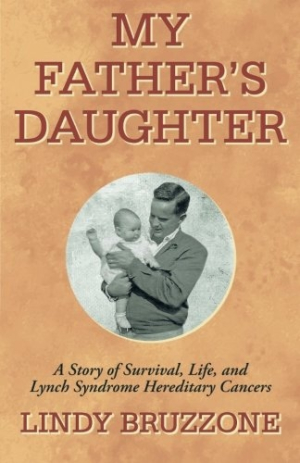My Father's Daughter
A Story of Survival, Life, and Lynch Syndrome Hereditary Cancers
This unflinching and honest account of a family’s struggles with cancer discusses genetic testing in revelatory ways.
Using personal details and a vivid storytelling style, My Father’s Daughter by Lindy Bruzzone reveals the growth and history of a family that is beset by cancer generation after generation.
Bruzzone grew up amid a cloud of uncertainty. Not only was her home life tumultuous, but her family is also genetically predisposed to developing cancer. As she got older, she learned more about the long history of cancer in her family, and struggled with her own diagnosis. Despite being raised in a broken home, she learned to rely on her relationships with her loved ones and on her religion to sustain her.
The book is a solidly optimistic survivor story, one which is in equal parts interesting, uplifting, and unexpected. One of the more compelling themes of this autobiography is eugenics, the concept that some people should not pass on their genes for the good of the human species. Many Americans may not be familiar with their country’s dangerous flirtation with this famously Nazi-endorsed idea, nor with the fact that it still influences thought in certain sectors of the medical profession.
The author decries both historical and modern eugenic thought while vociferously endorsing genetic testing, which has given her family members the power to plan for the increased possibility of cancer. Though this medical strategy could conceivably be used in a harmful way, its implementation in the author’s life has improved her entire family’s physical and emotional health and is likely to make many converts in this context.
The book skips around a great deal, not always remaining chronological. This can be confusing, since transitions, which generally land on chapter breaks, are not always well handled. However, for the most part, the story comes through clearly. Details of family life help to round out the book and generate unique, lively portraits of the people who populate the author’s life and family history. The result is intimate and deeply touching. The book bravely delves into emotional family problems frankly and without self-pity. The book also draws a satisfying parallel between its subjects’ understandings of their physical and psychological health.
In addition to the focus on cancer, the book details the author’s life and career in law enforcement. Though cancer is a constant background presence, the book sometimes veers into dramatic retellings of an interaction with a colorful parolee, a shooting at a prison, and other exciting stories. During these episodes, it can be easy to forget the book’s main thread, but the author consistently brings the story back around to cancer. The diversions help to make the book continuously engaging and intense.
My Father’s Daughter is a fascinating look into a life that is interesting because of far more than just its association with Lynch Syndrome. Cancer survivors and those living with Lynch Syndrome will find it particularly compelling, as will anyone with careers or family members in law enforcement.
Reviewed by
Anna Call
Disclosure: This article is not an endorsement, but a review. The publisher of this book provided free copies of the book and paid a small fee to have their book reviewed by a professional reviewer. Foreword Reviews and Clarion Reviews make no guarantee that the publisher will receive a positive review. Foreword Magazine, Inc. is disclosing this in accordance with the Federal Trade Commission’s 16 CFR, Part 255.

